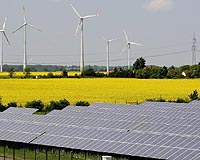| . |  |
. |
New Haven CT (SPX) May 04, 2010 The physiology of microbes living underground could determine the amount of carbon dioxide emitted from soils on a warmer Earth, according to a study published online this week in Nature Geoscience. Researchers at UC Irvine, Colorado State University and the Yale School of Forestry and Environmental Studies have found that as global temperatures increase, microbes in soil become less efficient over time in converting carbon in soil into carbon dioxide, which is a key contributor to climate warming. Microbes, in the form of bacteria and fungi, use carbon for energy to breathe, or respire, and to grow in size and in number. A model developed by the researchers shows microbes exhaling carbon dioxide furiously for a short period of time in a warmer environment, leaving less carbon for growth. As warmer temperatures persist, the less-efficient use of carbon by the microbes causes them to decrease in number, eventually resulting in less carbon dioxide being emitted into the atmosphere. "Microbes aren't the destructive agents of global warming that scientists had previously believed," said Steven Allison, lead author of the study and assistant professor of ecology and evolutionary biology at UC Irvine. "Microbes function like humans-they take in carbon-based fuel and breathe out carbon dioxide. They are the engines that drive carbon cycling in soils. In a balanced environment, plants store carbon in the soil and microbes use that carbon to grow. The microbes then produce enzymes that convert soil carbon into atmospheric carbon dioxide." The study, "Soil-Carbon Response to Warming Dependent on Microbial Physiology," contradicts the results of older models that assume microbes will continue to spew ever-increasing amounts of carbon dioxide into the atmosphere as the climate continues to warm. The new simulations suggest that if microbial efficiency declines in a warmer world, carbon dioxide emissions will fall back to pre-warming levels, a pattern seen in field experiments. But if microbes manage to adapt to the warmth-for instance through increases in enzyme activity-emissions could intensify. "When we developed a model based on the actual biology of soil microbes, we found that soil carbon may not be lost to the atmosphere as the climate warms," said Matthew Wallenstein, of the Natural Resource Ecology Laboratory at Colorado State University. "Conventional ecosystem models that didn't include enzymes did not make the same predictions." Mark Bradford, assistant professor of terrestrial ecosystem ecology at Yale, said there is intense debate in the scientific community over whether the loss of soil carbon will contribute to global warming. "The challenge we have in predicting this is that the microbial processes causing this loss are poorly understood," he said. "More research in this area will help reduce uncertainties in climate prediction."
Share This Article With Planet Earth
Related Links Yale Climate Science News - Modeling, Mitigation Adaptation
 Climate: focus on actions not treaty, says UN official
Climate: focus on actions not treaty, says UN officialBonn (AFP) May 3, 2010 Stymied global climate talks should shift focus from a polarising debate over a future treaty to immediate concrete action, the UN's top climate official said Monday. A "good outcome" of the UN climate conference slated for late November in the Mexican seaside resort of Cancun would be "an operational architecture on climate change," said Yvo de Boer. "How can we make action work on adap ... read more |
|
| The content herein, unless otherwise known to be public domain, are Copyright 1995-2010 - SpaceDaily. AFP and UPI Wire Stories are copyright Agence France-Presse and United Press International. ESA Portal Reports are copyright European Space Agency. All NASA sourced material is public domain. Additional copyrights may apply in whole or part to other bona fide parties. Advertising does not imply endorsement,agreement or approval of any opinions, statements or information provided by SpaceDaily on any Web page published or hosted by SpaceDaily. Privacy Statement |